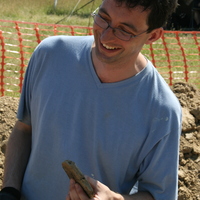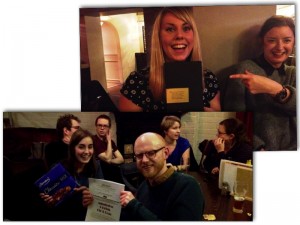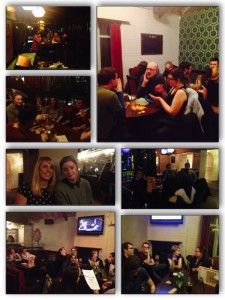Last Friday (22nd May 2015) saw Newcastle University’s 12th Annual Postgraduate Forum Conference go off with a bang. A really fantastic range of papers and posters were presented from Newcastle and beyond, displaying some really varied research.
The theme of the conference was “Disruptions”, which had taken root from marketing and commercial theory, as chair Amy Shields explained in her introduction. I think it is fair to say that each paper developed and worked with this theme in really varied and fruitful directions.
The first panel comprised of Skylar Arbuthnot, Samuel Pearson and Victoria Hughes. Arbuthnot gave us some interesting food for thought in local archaeology by suggesting that the understood disruption of Roman settlement could be rethought if we looked for forts in different places. Pearson followed this with an interesting discussion of Lollards and Lollardy heretics in Elizabethan England, and the evidence for and against familial conversion. Finally Hughes looked at some of the Christian responses to a Pagan emperor in the Roman world, and the disruption they felt it caused to their religion.
This was followed by a quick break and a discussion from our keynote speaker, Harry Dickinson (Edinburgh University) who showed a fantastic range of caricature imagery from Britain during the French Revolution and the comedic responses that disruption caused in this country. He almost caused a disruption of his own when he revealed in a denouement that he is, although local, a Sunderland supporter!
After that was a very posh spread for lunch!
Our second panel was Stephanie Moat, Andrew Marriot and myself, Chris Mowat. Moat took the idea of non-classical art styles being regarded as “inferior” in classical archaeologist scholarship and disrupted it herself with the theory of mimetic practice. Marriott then took us to one of the world’s biggest disruptions, the First World War, and looked at how trench art can actually provide new ways of thinking about the historical, military and social developments and outcomes of the war. Thirdly my own paper looked at dreams in the Roman Republic as not simply a disruption of sleep but also a message of potential disruption to the future, and how gender reinforced structures of importance, even in sleep.
The third panel had John Burke and Anthony Stewart. Burke provided stimulating discussion regarding the ongoing disruption of the island of Cyprus by looking at the ‘ghost-town’ of Famagusta, and Stewart took us into Haiti with a look at the local religion of Vodou and the island’s cultural understanding and treatment of mental illnesses.
The poster session showed off, in particular, some of the varied work being done by Masters students.
The final panel of the day was Steven Server and Ben Morton. Server took us through the political climate of the US in the ‘6os and ‘70s through the lens of risk theory, and the disruptions to society and politics during the period. Finally, Morton brought us back to thinking about the theme as a whole and the way we as historians, classicists and archaeologists look at static movement and disruption.
At the wine reception, the Keith Wrightson and Norman McCall prizes were presented. The runner up prize was presented to Andrew Moat, and the winner for the best paper was Stephanie Moat; for posters, Victoria Bell won the runner up prize, with Stacey Astill being the winner.
I, on behalf of the PGF, would like to give a big thank you to Keith Wrightson and Norman McCall for, as always, supporting our event and taking a keen interest in our postgraduate research community – Thank You.
As well, we would like to thank the speakers and audience through the day for the stimulating presentations and fascinating discussion. The whole day was a great success and a lot of good fun. We would all also like to thank Shields for organising and chairing a fantastic conference – thank you!
See you all next year!
Chris Mowat
PGF Committee Member
 Dr James Gerrard is a lecturer in Roman archaeology here at Newcastle, he studied at Sheffield for his BA in Archaeology and Prehistory, before completing his MA (in Archaeological Research) and PhD (Pottery and the end of Roman Britain: the view from south-western Britain) at York. Check out his project blog: https://blogs.ncl.ac.uk/luftonarchaeology/
Dr James Gerrard is a lecturer in Roman archaeology here at Newcastle, he studied at Sheffield for his BA in Archaeology and Prehistory, before completing his MA (in Archaeological Research) and PhD (Pottery and the end of Roman Britain: the view from south-western Britain) at York. Check out his project blog: https://blogs.ncl.ac.uk/luftonarchaeology/
 o
o